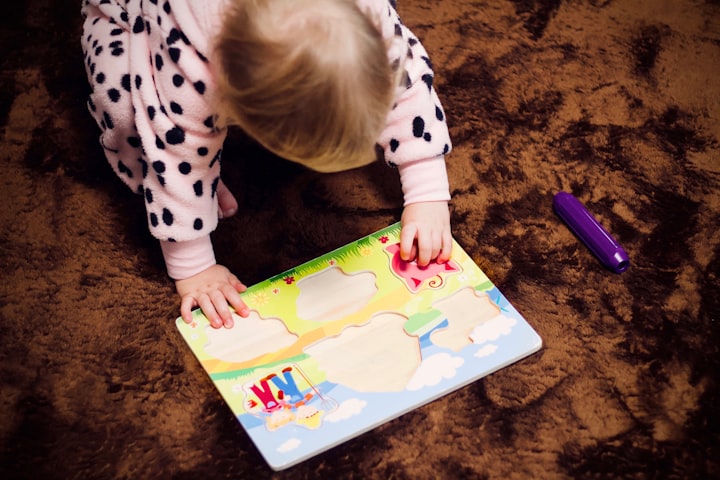Baby Brain Builders
The Magical Benefits of Puzzles for Infants

Puzzles have long been recognized as a source of entertainment and learning for children. However, their benefits extend beyond mere amusement, even to the youngest members of our families—babies. In this essay, we will explore the advantages of puzzles for babies, shedding light on the cognitive, motor, and emotional development they foster. As we delve into the world of early childhood education, we will discover how this seemingly simple play activity can lay a strong foundation for a child's lifelong learning journey.
Cognitive Development
Puzzles, even those designed for babies, offer significant cognitive benefits. As babies engage with puzzles, they develop essential cognitive skills such as problem-solving, spatial awareness, and shape recognition. When a baby attempts to fit a puzzle piece into its corresponding slot, they are engaging in basic problem-solving, learning cause-and-effect relationships, and developing critical thinking skills.
Moreover, puzzles encourage the development of spatial intelligence. Babies learn to manipulate objects in their minds, understanding how different pieces fit together to form a complete picture. This spatial awareness becomes increasingly important as a child grows and tackles more complex academic subjects, such as mathematics and geometry.
Fine and Gross Motor Skills
Puzzle play also contributes significantly to the development of fine and gross motor skills. When babies pick up and manipulate puzzle pieces, they are honing their fine motor skills, enhancing hand-eye coordination and dexterity. This improved coordination not only aids in puzzle-solving but also in various everyday activities, such as feeding themselves or learning to write.
Furthermore, assembling larger puzzles or puzzle boards can help babies refine their gross motor skills. Crawling or walking to retrieve pieces, reaching for distant parts of the puzzle, and placing pieces accurately all contribute to improved coordination and physical strength.
Language and Communication
Puzzle play provides opportunities for language and communication development. Parents or caregivers often engage in interactive conversations with babies while playing with puzzles, describing the colors, shapes, and objects depicted on the puzzle pieces. This verbal interaction enhances a baby's vocabulary and comprehension skills. Babies begin to associate words with images, laying the groundwork for future language development and literacy.
Additionally, puzzle play can promote social interaction when done in a group setting. Babies learn valuable social skills, such as taking turns and cooperating with others, which are essential for their overall development and future social interactions.
Problem-Solving and Patience
As babies engage with puzzles, they encounter challenges and learn to persevere. They quickly discover that trial and error can lead to success, fostering problem-solving abilities. These early experiences with puzzles teach babies the value of patience and persistence, skills that will serve them well throughout their lives.
By attempting to fit pieces together and facing occasional setbacks, babies develop resilience and a growth mindset. They learn that mistakes are part of the learning process and that with effort, they can overcome obstacles.
Emotional and Cognitive Milestones
Puzzle play can be emotionally rewarding for babies. Successfully completing a puzzle offers a sense of accomplishment and boosts self-esteem. This positive reinforcement encourages a love for learning and exploration.
Moreover, puzzles can provide a sense of security and comfort. The focused, repetitive nature of puzzle play can be soothing and calming for babies, helping them manage stress and anxiety.
In conclusion, puzzles for babies are not just toys; they are tools for cognitive, motor, and emotional development. Early exposure to puzzles lays the foundation for critical thinking, problem-solving, and other essential life skills. Encouraging puzzle play in infancy is a simple yet effective way to nurture a child's potential and set them on the path to lifelong learning and success.






Comments (1)
Nice! Good puzzles! Great work!